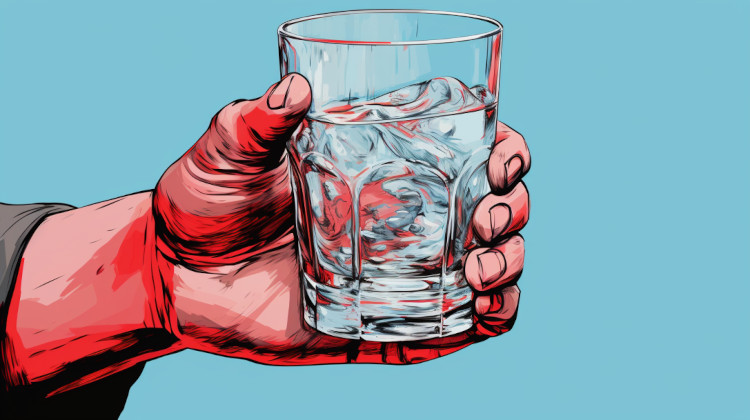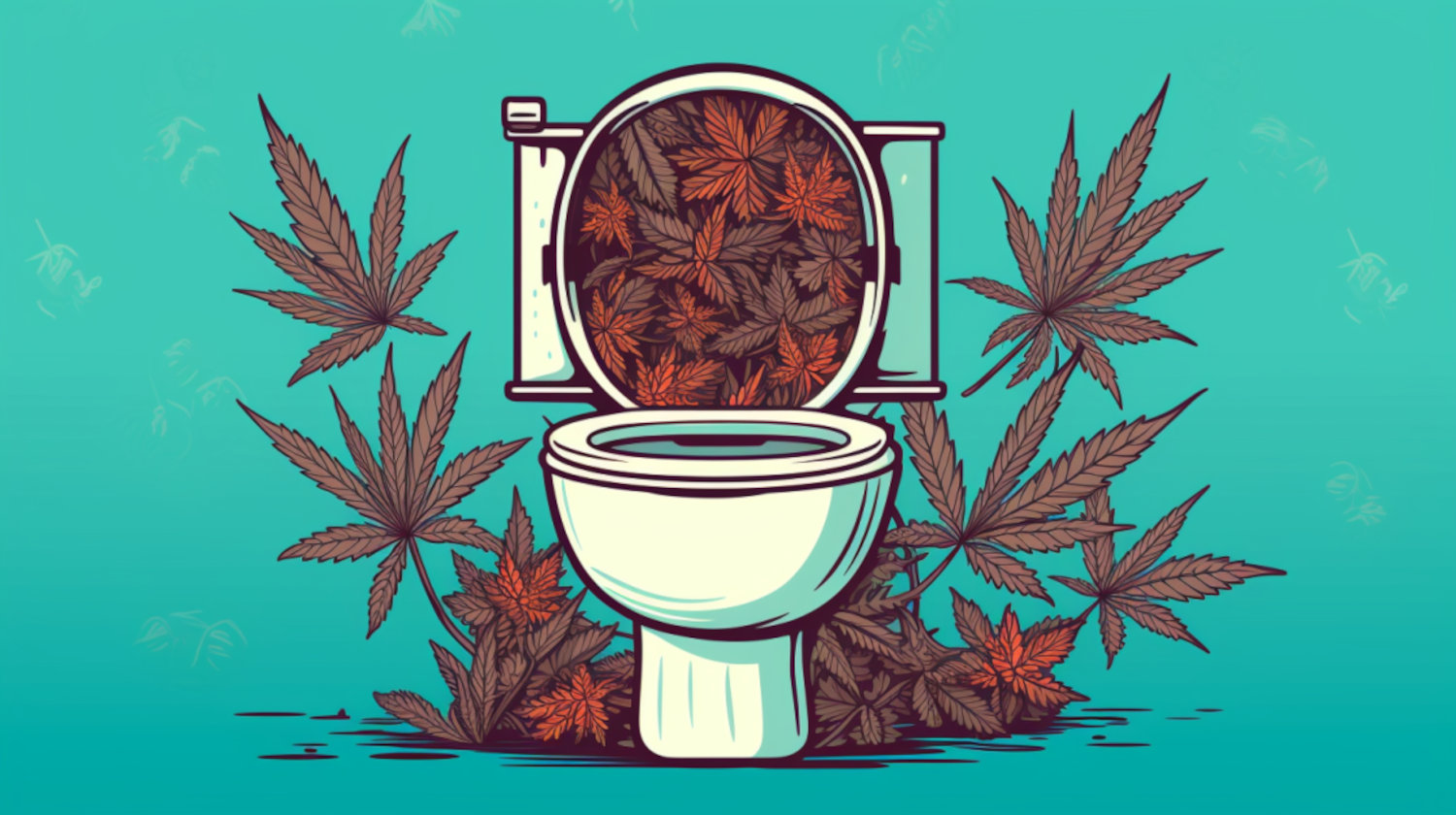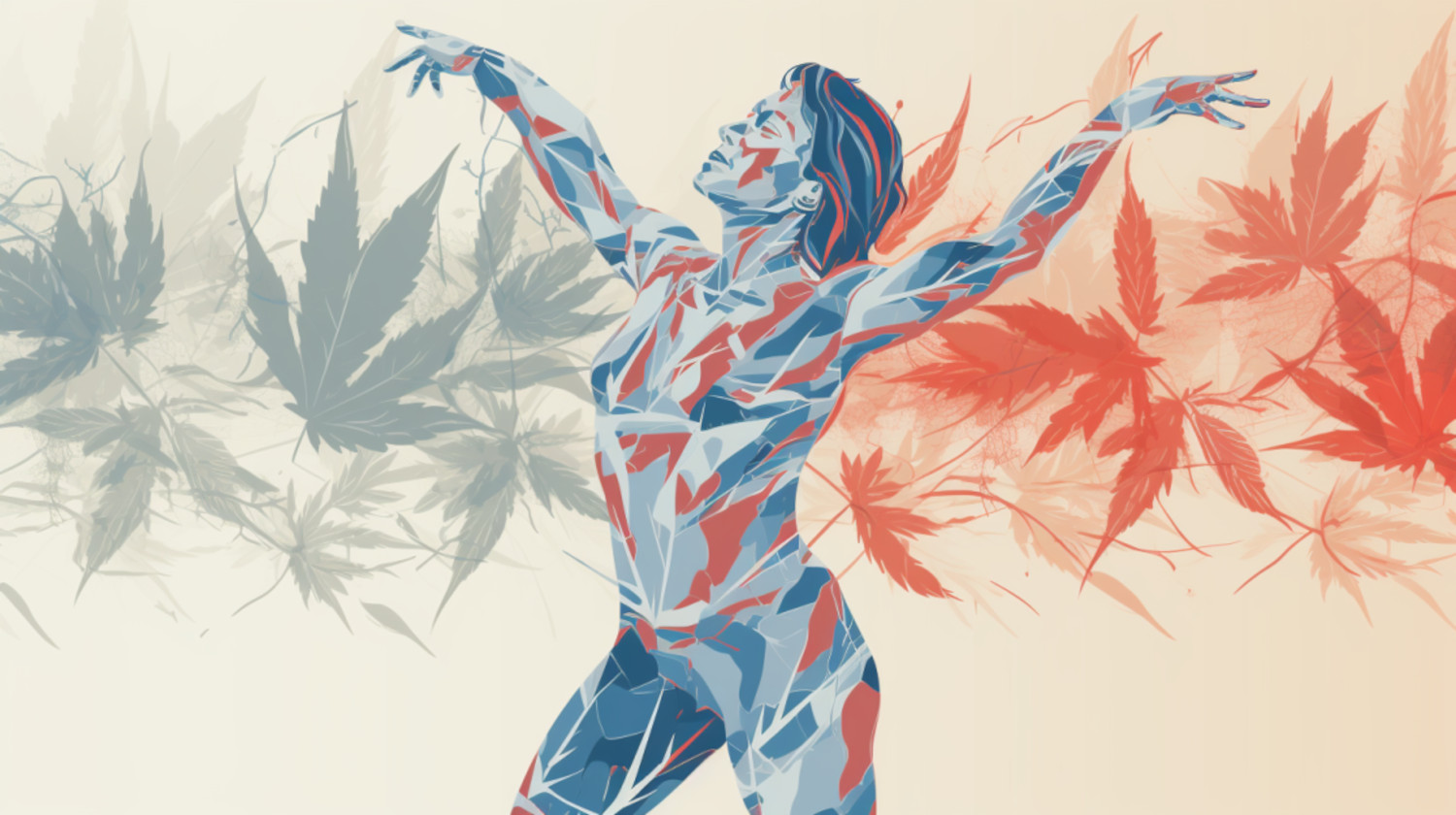Ahh, that old cannabis smell. Whether opening a container of fresh flower or entering a weed-smoke-filled room, the distinctive aroma of cannabis is hard to mistake. One place you might not expect this scent to emerge is in the restroom.
Yet, if you have consumed cannabis in any form recently, you may notice your toilet bowl smells like a weed bowl and wonder: "Why does my pee smell like weed?"
What Gives Urine Its Distinctive Smell?
Urine isn’t just a simple waste product. It’s a complex mixture of various compounds, each contributing to its unique odor. Factors like diet, hydration, medications, and even certain illnesses can influence the smell of urine.
After we eat or drink, our kidneys filter our blood to create urine, sorting it into water and waste. Urine consists of about 91% to 95% water. The remaining is made up of waste, including compounds like urea, creatine, ammonium, and electrolytes.1 With more water, urine is diluted, becoming lighter in color with less urine odor. The chemical composition of the waste, including phenols, determines the odor of the urine.
Phenols are chemical compounds produced as your body metabolizes anything you have consumed. Two phenols, 4-vinyl guaiacol and vanillin, are found in high concentrations in urine and play a significant role in its scent. But it's not just about concentration. Even compounds present in smaller amounts, like (E)-β-damascenone and oct-1-en-3-one, can have a noticeable impact on the overall aroma of urine. These compounds, coupled with one’s daily habits, result in the unique smell of urine.2
Why Does Weed Smell the Way it Does?

More people are becoming attuned to the scent of weed. Over 200 compounds, including cannabinoids and terpenes, blend to create cannabis’ unique scent.3 Cannabinoids are a group of chemically similar compounds produced by the cannabis plant, but there are other types of cannabinoids, like the endocannabinoids produced by the body. Terpenes are aromatic molecules found in many plants, including cannabis. Terpenes are responsible for many of the identifiable scents in cannabis. Common cultivar names refer to the scents and flavors produced by the terpenes in the plant, such as lemon, sour, or berry.4 Beyond their aromatic properties, terpenes play a crucial role in the medicinal benefits of cannabis. Blends of cannabinoids and terpenes synergize to enhance their therapeutic effects, also known as the entourage effect.5
But not all cannabis smells like citrus or lavender. The peculiar gassy or skunk odor of cannabis doesn’t originate from terpenes. Instead, it's attributed to volatile sulfur compounds (VSCs), particularly 3-methyl-2-butene-1-thiol, labeled VSC3. This compound bears a striking resemblance to the defensive spray of skunks, explaining the familiar pungent aroma.6
Researchers found that the higher the concentration of VSC3 in the cannabis strain, the more intense and sulfurous the skunk smell. These scientists plan to investigate VSC3 levels in future studies to assess their potential role in the healing factors of cannabis.
Why Does My Pee Smell Like Weed?
Of course, what goes in, must come out. As your body processes and breaks down the components present in cannabis, byproducts are excreted in the urine. Yet, researchers have not pinpointed precisely what waste products make urine smell like weed.
One theory revolves around compounds found both in cannabis and in urine. Dimethyl sulfate is present in urine, dimethyl trisulfide in cannabis.7 Although there is no direct research linking dimethyl trisulfide to the smell of cannabis in urine, it might be a factor in producing the familiar weed scent.
Another possibility is the way the body processes cannabis. Cannabinoids are lipophilic, meaning they are stored in fat cells. As the body metabolizes these fat cells (during exercise or fasting, for example), stored cannabinoids are released, which could impact the smell of urine.
For now, the assumption is that remnants of the compounds responsible for cannabis' aroma, or compounds that share similarities, make their way into the urine, leading to that recognizable weed-like smell.
Does Weed Make You Pee?

Besides its mind-altering properties, cannabis can affect bodily processes such as urine production. Interestingly, some studies show that cannabis will increase urine production, while other studies claim it reduces the output of urine.8,9
Diuretics are a classification of drugs that will increase urination. Medical practitioners in other cultures historically used cannabis as a natural diuretic to reduce excess fluids in the body and release toxins.
How to Stop Urine From Smelling Like Weed
If you find that your pee smells like weed, there are a few tried-and-true ways to reduce the odor and get things back to normal.
- Hydrate: Dehydration occurs when your body is lacking in fluids. Your body needs fluids to function properly. Ideally, your urine should appear clear or pale yellow. The fluids you consume daily dilute your urine, make it less concentrated, and may lessen the weed odor. Eight glasses of water daily are recommended, but you can increase your hydration by drinking milk, juice, herbal teas, or eating high-water-content foods like watermelon and spinach.
- Dietary changes: Certain foods and beverages break down during digestion into components that find their way into urine, producing strong-smelling pee. Some of the culprits of foul-smelling urine are asparagus, coffee, honey, dried fruit, garlic, onion, or brussel sprouts. This odor is temporary and lasts only a day or two. Making these dietary changes may not eliminate the weed odor, but it will eliminate other factors adding to urine smells.
- Go when you have to go: Sometimes there is no restroom nearby, or you’re in a situation where you can't excuse yourself for a trip to the bathroom. It's okay to wait to go occasionally, but try not to make it a habit. The longer you "hold" your pee, the more concentrated your urine becomes in your bladder. You'll also notice a more pungent odor the longer you delay. Although holding your pee won't cause kidney conditions or UTI by itself, the healthy move is to urinate as soon as you feel an increased urge to go.
- Review medicine or supplements: Vitamins and medications often cause a potent urine smell. B6 and other B vitamins can create a strong odor. Antibiotics, sulfa drugs, and some other prescription medications can cause a foul smell. Taking these with ample amounts of water may reduce the odor. Vitamin C tablets taken orally may reduce odors from urine.
Talk with your doctor: If these tactics don’t help, you may need to consult with a medical professional. Sometimes, a strong odor in urine can indicate an underlying medical condition or disease, such as a urinary tract infection or metabolic disorder. If your symptoms persist, always contact your doctor.
References
- Sarigul N, Korkmaz F, Kurultak İ. A New Artificial Urine Protocol to Better Imitate Human Urine. Sci Rep. 2019;9(1):20159. Published 2019 Dec 27. doi:10.1038/s41598-019-56693-4
↩︎ - Wagenstaller M, Buettner A. Quantitative Determination of Common Urinary Odorants and Their Glucuronide Conjugates in Human Urine. Metabolites. 2013;3(3):637-657. doi:https://doi.org/10.3390/metabo3030637
↩︎ - Oswald IWH, Ojeda MA, Pobanz RJ, et al. Identification of a New Family of Prenylated Volatile Sulfur Compounds in Cannabis Revealed by Comprehensive Two-Dimensional Gas Chromatography. ACS Omega. 2021;6(47):31667-31676. doi:https://doi.org/10.1021/acsomega.1c04196
↩︎ - Mudge EM, Brown PN, Murch SJ. The Terroir of Cannabis: Terpene Metabolomics as a Tool to Understand Cannabis sativa Selections. Planta Medica. 2019;85(09/10):781-796. doi:https://doi.org/10.1055/a-0915-2550
↩︎ - Sommano SR, Chittasupho C, Ruksiriwanich W, Jantrawut P. The Cannabis Terpenes. Molecules. 2020;25(24):5792. doi:https://doi.org/10.3390/molecules25245792
↩︎ - Oswald IWH, Ojeda MA, Pobanz RJ, et al. Identification of a New Family of Prenylated Volatile Sulfur Compounds in Cannabis Revealed by Comprehensive Two-Dimensional Gas Chromatography. ACS Omega. 2021;6(47):31667-31676. doi:https://doi.org/10.1021/acsomega.1c04196
↩︎ - Mochalski P, Unterkofler K. Quantification of selected volatile organic compounds in human urine by gas chromatography selective reagent ionization time of flight mass spectrometry (GC-SRI-TOF-MS) coupled with head-space solid-phase microextraction (HS-SPME). The Analyst. 2016;141(15):4796-4803. doi:https://doi.org/10.1039/c6an00825a
↩︎ - Paronis CA, Thakur GA, Bajaj S, et al. Diuretic Effects of Cannabinoids. Journal of Pharmacology and Experimental Therapeutics. 2012;344(1):8-14. doi:https://doi.org/10.1124/jpet.112.199331
↩︎ - Apostolidis A. Taming the Cannabinoids: New Potential in the Pharmacologic Control of Lower Urinary Tract Dysfunction. European Urology. 2012;61(1):107-109. doi:https://doi.org/10.1016/j.eururo.2011.09.025
↩︎
The information in this article and any included images or charts are for educational purposes only. This information is neither a substitute for, nor does it replace, professional legal advice or medical advice, diagnosis, or treatment. If you have any concerns or questions about laws, regulations, or your health, you should always consult with an attorney, physician or other licensed professional.




